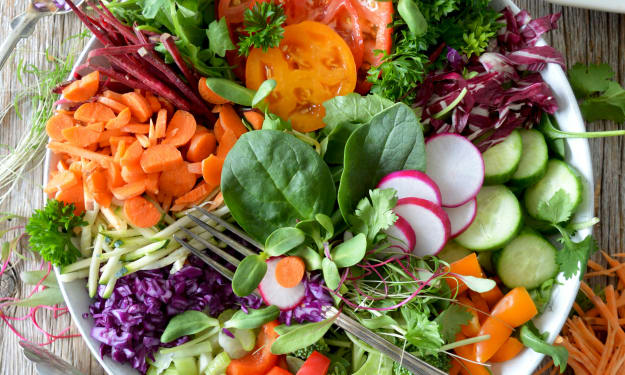science
Your digital Food Lab; Feast explores the science of food, food production technology, the origin and future of the foods we eat.


90% Of The Cheese We Consume Has Pfizer GMO's Thanks To A Cheesy Loophole
Rennet is a clotting agent that separates the liquid from the solid portions of milk by curdling it into cheese. It is a necessary step in the production of cheese.
Richelle Gerner, Rootbound HomesteadPublished 6 days ago in Feast"Mastering the Art of Grilling with most affordable grill''
Grilling, the age-old culinary tradition that transcends cultures and brings people together, holds a special place in the hearts of food enthusiasts worldwide. Whether it's the sizzle of succulent steaks, the aroma of smoky ribs, or the charred perfection of vegetables, there's something undeniably magical about cooking over an open flame.
Eimantas StuinaPublished 7 days ago in Feast

Wormholes Explained – Breaking Spacetime!..
Imagine a round window opening into distant domains, a vast entryway where existence are woven together in a design similar to an entertainer's deception. This is the strange fascination of wormholes: imaginary spacetime burrows that give prompt travel over huge inestimable distances. Be that as it may, do they truly hold the way to addressing the universe's mysteries, or would they say they are only the results of science's wild creative mind? Show up on a journey through the captivating universe of wormholes as we investigate the wildernesses of hypothetical material science.
Abdur RahmanPublished about a month ago in FeastUnveiling the Layers
In the vast tapestry of human experience, there exists a complex interplay between physical health and mental well-being. Among the myriad threads woven into this intricate pattern, the relationship between obesity and mental health emerges as a poignant narrative, fraught with internal battles and societal stigma. In this exploration, we delve into the depths of this intersection, peeling back the layers to reveal the profound impact it has on the protagonist's journey.
10 Essential Tips for Staying Cool in the Summer Heat
Introduction: As the scorching summer sun beats down, staying cool becomes a top priority for many. From soaring temperatures to stifling humidity, the summer heat can be relentless. However, with the right strategies and habits, you can beat the heat and enjoy the season to its fullest. Here are 10 essential tips to help you stay cool and comfortable during the summer months.
YathirajaSampathKumar K RPublished about a month ago in Feast

Feast or Famine: Understanding the History of Feasting
Feasting is a cultural practice that has been a part of human history for millennia. From ancient civilizations to modern societies, the act of coming together to share food and celebrate has played a significant role in shaping our social structures, traditions, and even our evolution. In this article, we will delve into the history of feasting, exploring its origins, evolution, and cultural significance
BLESSING COOLPublished about a month ago in Feast

Bread Through Time
Bread, a simple yet essential food, has journeyed alongside humanity throughout history, shaping cultures, economies, and daily life. This exploration delves into the intricate story of bread, from its humble origins to becoming a global culinary icon.


"The most delicious ingredient you've never heard of."
Tonka beans are a type of seed that is popular in gourmet cooking, particularly in desserts. These wrinkly, black beans are known for their distinctive aroma, which is a mix of vanilla, cinnamon, almond, and clove, with some even claiming to detect notes of cherry, sandalwood, licorice, and caramel. But did you know that tonka beans have been banned in the United States since the 1950s?
Abdul Hannan SaifPublished 2 months ago in Feast

The Fascinating World of Food: 10 Surprising Facts
The first time I said "I love you," I'm pretty sure I said it to some sort of food item but as much as I and well most of us love food here's the question how well do we really know it?
Abdul Hannan SaifPublished 2 months ago in FeastCooking Up Love with These Romantic Dinner Recipes
This article provides a comprehensive guide on cooking romantic dinners for your partner, including recipes, cooking instructions, tips for setting the atmosphere, wine pairing suggestions, dessert ideas, and successful cooking date tips.
Timothy A RowlandPublished 2 months ago in FeastEasy Recipes and Tips for Non-Cooks
A curated collection of simple recipes designed to boost confidence and inspire non-cooks to explore the world of cooking. Introduction to Easy Recipes for Non-Cooks
Timothy A RowlandPublished 2 months ago in Feast

6 Vegetables And Produces That Can KILL You If NOT Eaten Correctly
With all the junk that we put into our bodies, it is sometimes a good idea to detoxify and clean up our guts with some greens and produce to make sure that whatever toxins or unhealthy ingredients get flushed out and cleaned up by fresh, wholesome food items. Back when we were kids we were often told to eat our greens if we wanted to be strong and healthy. True enough, vegetables pack loads of vitamins, minerals, and even a good dose of protein that can sustain us throughout our busy day. Because of these positive benefits, you would think that there could be nothing wrong with eating greens and fresh produce, right? Unfortunately, despite the amount of good we get from them, there is also an equal amount of bad that may potentially be lethal to us humans. Vegetables are plants, after all, and plants - like any other living organism - have their own set of special defenses to keep them safe we may be biting into a plant that's already released a deadly concoction of toxins because we were too preoccupied without diets that we failed to pay attention on how we prepared them. In today's list, we are counting down 10 harmless-looking vegetables and produce that may potentially kill you if they are poorly prepared. So before you dig into that salad and take a huge gulp of that Kale smoothie, you may want to see this!
Abdul Hannan SaifPublished 2 months ago in Feast



















